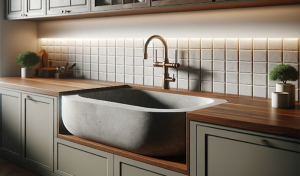Is stainless steel the best material for kitchen sinks? Today’s housewares market offers many other choices to consider, so it’s important to understand what stainless steel offers and how other materials compare. Comparing sink features such as durability, price, quality, and ease of maintenance can help you decide on the best material for your kitchen sink.
Stainless Steel, the Gold Standard of Kitchen Sinks
Stainless steel resists stains, and is not easily damaged by heat, cold, or impact. Sold by gauge to indicate strength, a 22 gauge sink can vibrate from the garbage disposal, while a 16 or 18 gauge sink is sturdier and can handle a high-quality faucet, plus a disposal. Widely available, 22 gauge sinks are considered builder’s grade and most home improvement experts recommend buying a lower gauge. Prices typically range from $100-$800, although you can often get bargains at big-box stores, or spend considerably more for low gauge products.
Pros and Cons of Other Materials
Acrylic sinks, made of polycarbonate, fiberglass, and resin, are durable, lightweight, inexpensive, and easy to install. Since the material is the same color throughout, you can remove small scratches with car buffing compound. One downside is that you can ruin the sink if you try to clean a paintbrush you have used for oil paint. It is also very susceptible to heat, and is subject to chips and scratches from dropped silverware and pots, and even from abrasive cleaners. Prices start at under $100.
Porcelain or enamel over cast iron sinks are popular classics that are heavy, durable and excellent at withstanding heat. You can damage a porcelain sink if you drop a pan in it, while cleaning with abrasive cleaners dulls the finish and makes it more susceptible to staining. A consideration for many homeowners is the weight. Your cabinets must be structurally sound, with adequate support for the sink. Costs range from $300-$900.
Soapstone sinks, a natural product made of slabs of soapstone, make for a hard, durable sink that resists chemicals, stains, heat, acid, and water. However, since it is a natural stone, it can chip and scratch from dropped pans and utensils. Prices start around $1,000.
Composite Sink Materials
Solid surface sinks are made of 66% Aluminium TriHydrate (ATH), a fine white powder derived from bauxite; and 33% binding resins made from acrylic or polyester. Typically molded into countertops, they are very easy to clean since they lack crevices that can harbor dirt. They can be damaged by sharp objects and high heat. Sinks with a matte or brushed finish show fewer scratches and watermarks. These sinks are priced as part of the countertop, which run about $50 per square foot.
Composite sinks, manufactured from crushed granite or quartz bound together with acrylic resin, are hard, heat resistant, and scratch resistant. The granite versions, priced at $300-$600, are the hardest material on the market. For best results with quartz sinks, choose light colors or aggregated patterns that are less likely to show scratches and chips. Quartz models run $300-$1,200.
After evaluating different materials for kitchen sinks, many homeowners still go with stainless steel as the best blend of value and characteristics. If you’re remodeling your home and want to explore the best material for kitchen sinks, the experienced sink installers at Mountain States Kitchen & Bath can show you each option, and make recommendations based on your budget and lifestyle.








